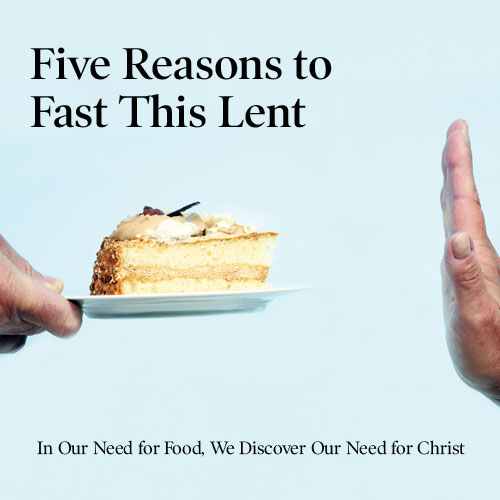Five Reasons to Fast This Lent
In Our Need for Food, We Discover Our Need for Christ

But we don’t. At least, most of us don’t.
What don’t we do?
We don’t fast. We don’t engage in one of the most ancient, fundamental and powerful disciplines in the Church’s treasury of spiritual practices.
Sure, on Ash Wednesday and Good Friday you can still find a decent number of Catholics abstaining from meat and limiting themselves to two snacks and a moderately sized meal. But you’ll also find almost as many of us complaining about it on Facebook and fantasizing about bacon.
And yes, in a few parishes, convents and homes live men and women who fast as our spiritual forefathers and mothers did — who forgo meals and treats more regularly and more rigorously. They, however, are the exception. The rest of us are the rule.
That’s not to say every Christian over the age of 12 should be following St. Catherine of Siena’s lead and trying to live on the Eucharist alone — with the occasional twig and berry thrown in for good measure. Extreme feats of fasting are for the very, very few and should only be undertaken under the care of a wise spiritual director.
Nevertheless, most of us could at least drink our coffee black for 40 days during Lent. Or abstain from meat on Fridays year-round. More of us could give up a meal here and there without suffering any great loss. And nearly all Christians could forgo dessert for the sake of Christ far more often than we do.
Human nature hasn’t changed in 2,000 years. It hasn’t changed in 6,000 years. And fasting — when done prayerfully, in moderation and always with an eye to charity — can still help conform that nature more perfectly to Christ’s.
But if that’s not reason enough to say good-bye to Starbucks until Easter, here are five more reasons to make the Church’s long-cherished spiritual discipline your own this Lent.
1. Fasting serves as an act of repentance. When we sin against friends and loved ones — when we say something unkind, forget an important date or break a promise — we don’t just say, “I’m sorry.” We also do something. We buy flowers or dinner or finally fix that bathroom sink. In other words, we make some kind of sacrifice to make up for what we’ve done wrong. For the same reason, when we sin against God, we fast. We sacrifice a meal, a sweet or a little extra salt, as a way of making reparation. God doesn’t demand that sacrifice. He doesn’t make his forgiveness conditional upon it. But in performing the sacrifice, we see more fully the depths of our own transgressions. We see our sin more clearly. And that makes us less inclined to sin in the same way again.
2. Fasting aids our intercessory prayers. The world is — now and until the end of time — a valley of tears. Marriages crumble. Loved ones waste away from cancer. Babies die in their mothers’ wombs, and war, famine and poverty ravage whole countries. People need our prayers. They need our intercession. And that intercession is made more powerful, more fruitful, by our fasts. In sacred Scripture, no one engages in serious intercessory prayer — not Daniel, not David, not one of the prophets, major or minor — without also engaging in fasting. That fasting made their prayers more than mere words. It made them actions — actions with urgency behind them. It can do the same for us.
3. Fasting strengthens our spiritual muscles. Before we can run, we walk. And before we can perform great acts of self-denial, we perform little acts of self-denial. The one prepares us for the other. It lays the foundation by training our bodies to go without and helping us learn that we don’t need to indulge our every want. Spiritual heroics — martyrdom, missionary work or even a life of chastity — aren’t the work of a day. They’re the work of a lifetime. They begin with saying “No” to a cookie, to a second helping or to a meal. They end with saying “Yes” to God.
4. Fasting unites us to the suffering Christ. Christ knew hunger. Christ knew abandonment. Christ knew pain. In his passion, he suffered beyond human imagining. And yet, he didn’t suffer beyond human comforting. The Church’s greatest mystics have all taught that, somehow, mysteriously, when we fast, we walk with Christ to Golgotha, easing his sufferings with the gift of our companionship. In our hunger, we grow closer to him. It unites us to him. And that brings him not only comfort — it brings him joy.
5. Fasting helps us discover who we are. We have nothing apart from God. We are nothing apart from God. But it’s so easy to forget that. It’s easy to forget the grace, the love and the mercy that makes our sheer existence possible. Fasting, however, can remind us of that. Deprived of food — of a meal, a favorite treat, a cherished drink — most of us grow tired and irritable. We see how quickly our good manners and pleasant dispositions disappear. In that, we see ourselves — fragile, broken and dependent. In our need for food, we discover our need for Christ. And as our hunger for food grows, so can our hunger for Christ. That alone is reason enough to fast.
Emily Stimpson writes from Steubenville, Ohio,
where she blogs at TheCatholicTable.com.
- Keywords:
- emily stimpson
- lenten fast
















